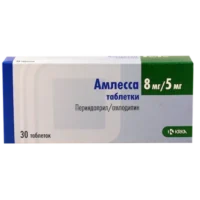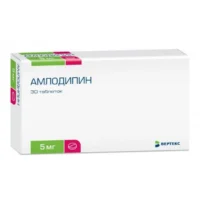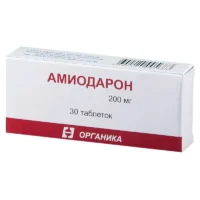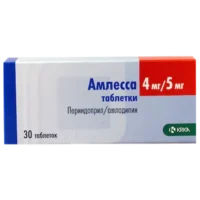Description
Prenesa (perindopril tert-butylamine) tablets 4 mg. №90
Ingredients
- Active ingredient: Perindopril tert-butylamine 4 mg.
Dosage
- Recommended dosage: The usual dose is 4 mg once daily. Dosage may be adjusted according to the individual’s response.
Indications
- Indicated for: Hypertension, heart failure, and post-myocardial infarction.
Contraindications
- Contraindications: Do not use in patients with a history of angioedema related to previous ACE inhibitor therapy.
Directions
- Take Prenesa tablets orally with or without food.
- Swallow the tablet whole with a full glass of water.
Scientific Evidence
Perindopril, the active ingredient in Prenesa, is an ACE inhibitor that works by blocking the conversion of angiotensin I to angiotensin II, leading to vasodilation and reduced aldosterone secretion. Clinical trials have shown that perindopril is effective in reducing blood pressure, improving cardiac function, and reducing the risk of cardiovascular events.
Additional Information
- Prenesa tablets should be stored at room temperature away from moisture and heat. Keep out of reach of children.
- It is important to regularly monitor blood pressure and kidney function while taking this medication.
Pharmacological Effects
Perindopril exerts its pharmacological effects by inhibiting the angiotensin-converting enzyme (ACE), thereby reducing the production of angiotensin II. This results in vasodilation, decreased aldosterone secretion, and ultimately, a reduction in blood pressure. Additionally, perindopril has been shown to have cardioprotective effects by improving endothelial function and reducing oxidative stress in the cardiovascular system.
Clinical Trials and Comparative Effectiveness
Clinical trials have demonstrated the efficacy of perindopril in reducing cardiovascular morbidity and mortality in patients with hypertension and heart failure. Compared to other ACE inhibitors, perindopril has shown similar efficacy but with a potentially lower risk of side effects such as cough. Its effectiveness in post-myocardial infarction patients has also been well established, making it a valuable treatment option in cardiovascular disease management.





